Since 2010, The Wisconsin Collaborative for Healthcare Quality (WCHQ)—a multi-stakeholder alliance working to improve quality—and the Partnership for Healthcare Payment Reform (PHPR) have worked with other organizations in Wisconsin to support providers and health plans in experimenting with innovative payment models. As part of that work, PHPR created two pilot projects: a bundled payment for total knee replacement and a shared savings project for adults living with diabetes.
According to the participating health plans and health systems, the success of these pilots depends in part on demand, support, and commitment from employers. As the primary source of coverage for Americans under 65, employers have the potential to be a formidable force in transforming the health care market. However, uptake of the new bundled payment pilot and shared savings projects has been slower than expected.
This slow uptake led to the following research questions:
1. What keeps employers from participating in initiatives that are designed to deliver better value for their health care investments?
2. What can multi-stakeholder organizations and their partners do to more effectively engage employers in considering and adopting innovations in health care purchasing?
This issue brief summarizes the research findings and their implications.


